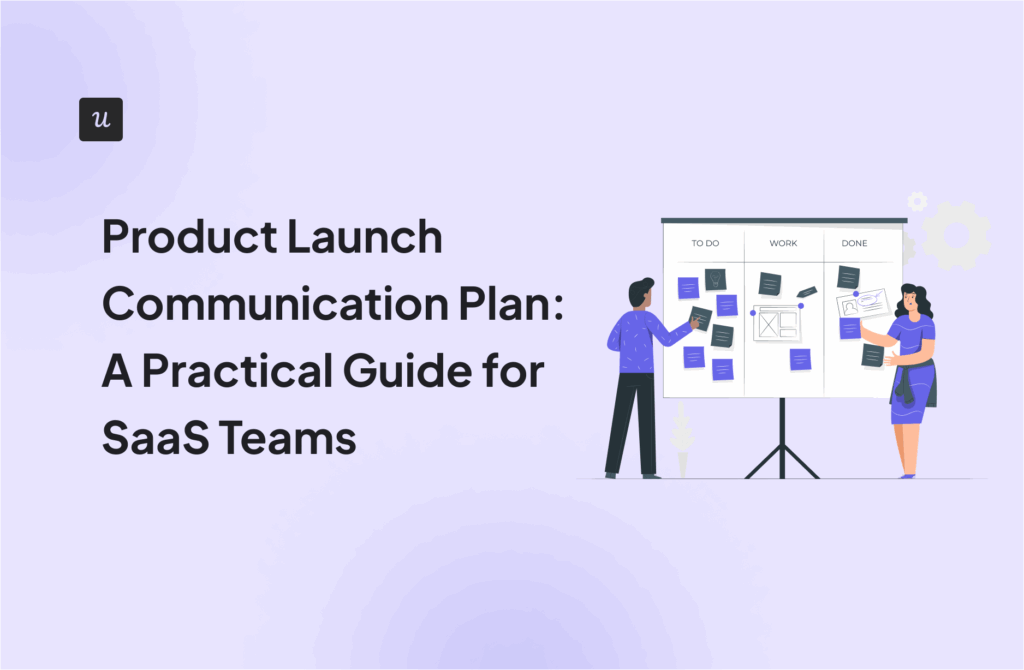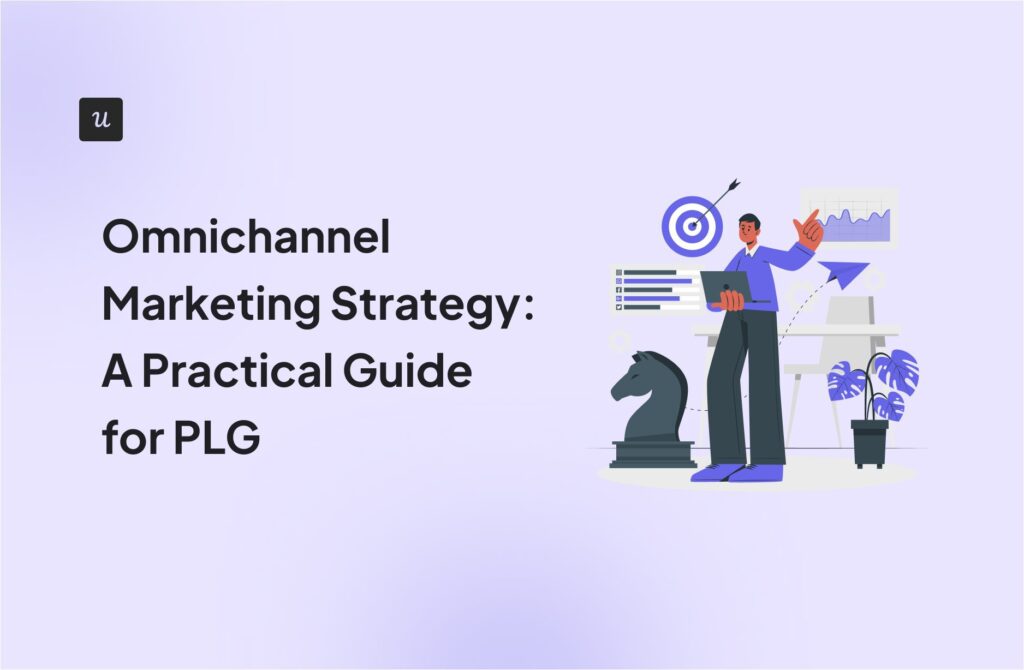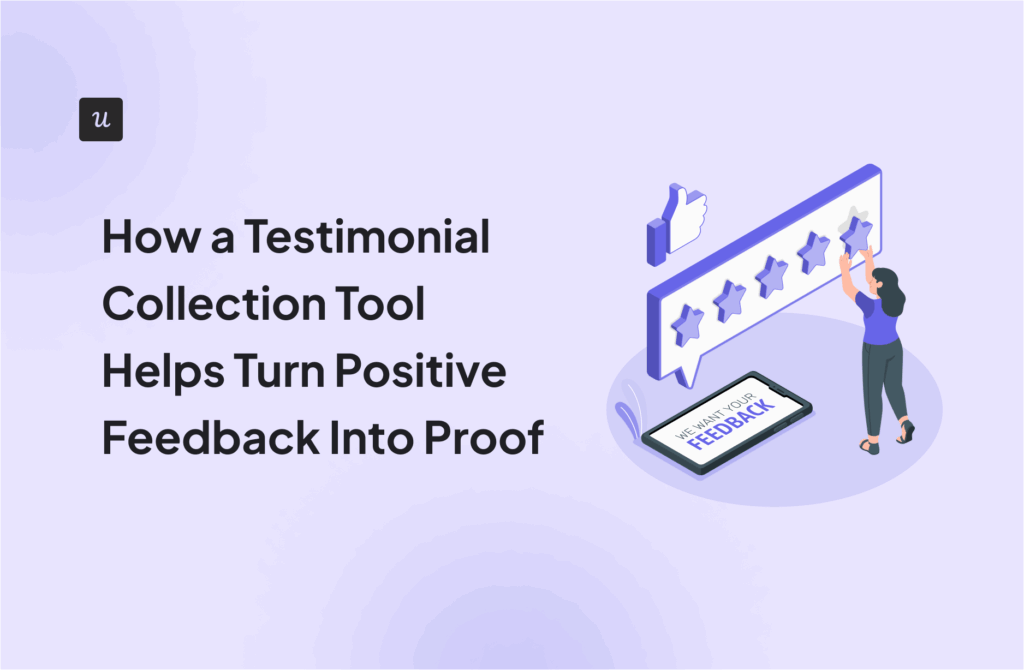
16 Most Common Product Marketing Manager Job Interview Questions And Answers
Try Userpilot Now
See Why 1,000+ Teams Choose Userpilot

What is the product marketing manager role?
The product marketing manager role stands at the crossroads of product and marketing. It’s a fairly new role – it lacks a strict definition, so the responsibilities of product marketing managers vary from company to company.
But in general, a product marketing manager has to communicate a product’s value to the market. This includes promoting the product benefits to potential users and prospects, but also to existing customers – “selling” them on the secondary features of the products (secondary onboarding).
The responsibilities of a product marketer fall into two types: pre-sign-up (acquisition) and post-sign-up (adoption and retention).
The amount of responsibilities you’ll have as a product marketing manager depends on how product-led the company is – the more product-led the company, the more post-signup activities the product marketer will do.
Natália Kimličková – Product Marketing Manager at Kontentino says:

“My job is to take care of the users post-signup. So basically – [new user] onboarding, product discovery, feature discovery, product adoption, retention and so on. All my tasks are around product – product updates, feature releases, video tutorial, written tutorials and so on…plus some data analysis.”
Pre-sign-up activities are different. They include planning product launches, writing product and feature pages, writing help docs, FAQs, sales/cs enablement assets, and creating bottom-of-the-funnel educational content.
Product marketing manager skills companies look for
While responsibilities and expectations for a product marketing manager are not clearly defined, there are five key skills that a hiring manager looks for in a potential product marketing manager.
#1 – Communication skills
Effective communication – being able to speak and write to an exceptionally high standard – is vital. You’ll have to present new products and write engaging copy, telling the ‘’story’’ of products, for various marketing channels on the regular basis. You’ll also have to communicate with numerous team members.
#2 – Collaboration skills
As a product marketing manager, you’ll have to collaborate with multiple teams across the business. This will often include the sales and marketing department, the engineering department, the product development team, product management, press and PR, and senior executives.
#3 – Analytical and research skills
A huge part of being a product marketing manager is obtaining insight into customer needs and experiences. Regular activities that you’ll need to be well acquainted with include data analysis, surveys, and customer interviews.
#4 – Project management skills
Being able to manage processes and projects is a must. You have to be able to juggle numerous activities and deadlines during a product launch, so having great project management skills – such as leadership, organization, and time management – means you keep on top of everything and help your team do the same.
#5 – Prioritization skills
Product marketing managers often juggle multiple projects at any one time and have a lot of demands to meet. Knowing which tasks are the most important – be it sales training, customer research, or a product launch – and how to dedicate yourself to that is a vital part of a product marketing manager role.
Most common interview questions for a product marketing manager role
What a company is looking for depends on its size, role requirements, seniority level, and even the kind of product it makes, but there are some core questions that will be asked during your product marketing interview so you need to be prepared.
Let’s have a look.
1. “Talk about some/one of the products you’ve previously marketed.”
An important part of product marketing is being able to talk about the product in simple terms, no matter how complex the product is. The person you’re talking to should be able to know what your product is and what it does, whether they be an expert or a layman.
Focus your answer on:
This is your opportunity to demonstrate your ability to communicate effectively. Show that you can explain what a complex piece of software does in a clear and straightforward manner by discussing products you’ve previously worked on.
Being able to recall which products you’ve worked on is great because it shows your potential employer that you not only have attention to detail but also demonstrates your substantial role in the process.
Be sure to mention your product’s target audience and its positioning as this shows that you know how important in-depth knowledge of your potential users is when marketing a product.
2. “How do you determine whether an onboarding process is working?”
Onboarding users is a key part of product marketing.
If you aren’t convincing customers to stick around after they’ve signed up for a trial, you’re not showing them the value of your product.
No value means they don’t stick around – this means no adoption, which means no retention, which means no revenue.
“You can buy acquisition but you cannot buy retention.” – Nir Eyal

Focus your answer on:
You need to show that you understand how important each onboarding stage is and that your goal is to drive the user to the activation stage where they experience the value your product offers, thus increasing adoption.
Discuss milestones in the user journey and how you measure them to determine if the onboarding process is working. For example, has the user reached the activation point? Have they performed the key activation events?
Also, draw on your own experience – highlight which key metrics tools you’ve used to measure onboarding success and discuss how you would improve the onboarding process. For example, micro surveys and churn surveys.
3. “What good product do you believe is marketed poorly?”
This is a common question. It’s designed to give the hiring manager a sense of your thought process, your creativity, and your problem-solving skills.
Focus your answer on:
Be careful of falling into a trap here as there is no “right” answer. Don’t approach the question with that in mind. Instead, be honest about your point of view.
This answer is all about demonstrating your understanding of positioning, messaging, and marketing campaigns – showing you know what works and what doesn’t.
Go into the interview with a few examples – maybe a company approached its target audience’s messaging wrong or the company promised something but couldn’t deliver it later. Identify what went wrong and, more importantly, how you would fix it.
4. “What’s the last marketing campaign that caught your eye?”
This question is designed to show hiring managers what sparks your interest, what makes you really pay attention, and what you consider to be a good marketing campaign. Plus, it also shows that you’re aware of the competitive landscape.
Focus your answer on:
Be honest about why this particular campaign caught your eye and highlight what makes it stand out – there are thousands of marketing campaigns out there, so why did this one grabbed your attention?
Not only will your answer show that you can critically analyze a marketing strategy, but being aware of what makes an engaging campaign will make you a better PMM.
5. “How do you approach product launches?”
Product launches are one of a PMM’s most important responsibilities. This question is designed to highlight your experience with product launches, including the processes (your role) and the outcomes (the launch results), and how you apply your knowledge and skills.
Focus your answer on:
Give a succinct overview of the entire product launch process, including key milestones and your individual role in the launch. Highlight any relevant experience and instances of innovative thinking, new knowledge and/or skills acquired, and if you learned from previous mistakes.
Be sure to emphasize how you use your time management and organization skills to ensure a successful product launch.
6. “Tell me about a product launch you’re most proud of.”
Here, they’re looking to understand your passion and what success means to you – you wouldn’t be proud of something that failed!
Focus your answer on:
This is your chance to stand out from the other candidates by showing what you’re passionate about. The hiring team is looking for stories so make sure you have some great examples to share.
And don’t forget, it’s not all about data and metrics. Maybe you’re particularly proud of how you creatively solved a problem or the impact you made on your target audience. Talk about what you did to get that result and why it means so much to you.
7. “How do you measure the success of your product marketing efforts?”
This is a technical product marketing interview question. It’s designed to not only show that you understand why it’s important to measure the success of your product marketing efforts, but how you identify which metrics track, how you track them, and how you use the data to drive results.
Focus your answer on:
The metrics and KPIs you track will depend on the product, so it’s good to show you that you know that. This is also a great opportunity to show that you’re up-to-date with the latest industry tools and to showcase your past experiences with measuring success.
Discuss the specific goals you would outline for the product, highlight which key metrics you would track –product usage, demo requests, user retention, etc.- and which measurement tools you would use to track your success.
8. “How do you see the collaboration between product marketing and product management?”
The product marketing role is a collaborative one.
Building positive relationships with your colleagues, especially the product manager, is a vital part of this role because you regularly work on projects across the company with multiple teams. You’ll mostly work with customer support and the sales team, so you’ll need to make sure you’re all aligned.
Focus your answer on:
Show that you understand product marketing is at the crossroads of product management and emphasize that you’re a team player with great communication skills.
Highlight your awareness of this role as a predominantly collaborative one, and discuss any instances that showcase your ability to collaborate with other departments and build strong relationships with your colleagues.
9. “Tell me what you think about the messaging on our website.”
This question is designed not only to show how much you understand messaging – a core part of product marketing – but to prove you’ve actually done research on the company prior to the interview.
A candidate who can’t answer a basic question about the company isn’t someone they’re going to hire!
Focus your answer on:
This is your chance to show your critical analysis and creative thinking skills.
It is crucial to research the company before your interview. Pay particular attention to its messaging, positioning, and target customers – identify what you think is good, what you think could be improved, and how you would do it.
Don’t phrase your answer negatively – rather, frame your response as an opportunity for improvement and new possibilities.
10. “What’s one project you’re proud of and what was your role in it?”
This question is an excellent opportunity for you to make yourself stand out from the other candidates.
Focus your answer on:
Don’t be afraid to brag!
Product marketing is collaborative and team-driven but you also need to show the hiring manager the value of you as an individual. Highlight your role in the project and what is it about that project that you’re especially proud of.
11. “A new feature that was just launched has a low adoption rate. What data would you look into and what actions would you take?”
Launching a new product feature is all well and good but if your users aren’t adopting it, what was the point?
This question is designed to test your problem-solving and analytics skills, as well as your grasp of adoption goals and key metrics. It also shows if you understand that a product marketing strategy doesn’t end once the product is launched – it’s an ongoing process.
Focus your answer on:
This is your chance to show that you’re data-driven and that you understand that your users have different use cases, so new feature launches need to focus on the right audience with the right message and be contextual.
Begin by explaining your thought process.
Look at the relevant data, analyze it to understand where the friction was: is it the messaging, the segmentation (your message reached the wrong audience), the timing? Also, at what point in the adoption stage did users get stuck? Once you know that, identify actionable solutions.
Be sure to mention throughout your answer why you chose that data, how you analyzed it, and how you reached a conclusion.
13. “How would you encourage customers to use our new feature/update their software?”
This question is designed to test your marketing knowledge regarding secondary onboarding.
The strategies you choose will depend on the product features but generally, you need to show you know which options are available and why it’s important to implement them in regards to encouraging upgrades and reducing customer churn.
Focus your answer on:
Launching new features and encouraging customers to update their software can be challenging, but if you can demonstrate that you understand the importance of using various digital marketing platforms to reach out to different customers, you’re on the right track.
Show that you know various types of secondary onboarding – email campaigns, in-app messaging, creative content like blog posts, social media infographics, and webinars – and talk them through how you and your product marketing team would appeal to customers using each type.
14. “How do you educate yourself about the product?”
The hiring team wants to see that you’re committed to learning how to use the product inside out and to see if your intellectual curiosity is up to their standards.
A PMM is nothing if he/she/they don’t understand the product and how it helps their audience.
But it’s not just about learning the product’s features – you need to show that your focus would be on understanding the benefits for each persona.
Focus your answer on:
Looking at the product from a customer perspective is what makes an exceptional PMM.
Explain that you would do this by looking over past user interviews or conducting some in order to understand how the users use the product, then go and replicate so you can put yourself in the customer’s shoes.
15. “How do you stay up to date with industry change?”
The product marketing industry is constantly changing and evolving. A great PMM is aware of this…an exceptional PMM stays up-to-date with this.
This question is designed to see if you’re dedicated to constantly learning and improving. A candidate with their finger on the pulse is very appealing.
Focus your answer on:
Your answer must show that you are a committed, continuous learner.
There are numerous ways of staying up to date with industry trends – reading newly published product marketing books, subscribing to industry newsletters or podcasts, following industry-related hashtags, or joining groups of industry professionals on social media platforms like LinkedIn and Facebook where you network and keep each other informed.
It’s great to show that you’re willing to do this, but it’s even better if you already do this – have specific examples you can use during your product marketing interview.
16. “What tool stacks have you used in previous product marketing roles?”
Whether it’s tools for driving product adoption, customer communication, email automation, or analytics tools, every PMM needs to have at least some experience with using a mix of tools.
Focus your answer on:
If you’ve used the same tools as the hiring company, brilliant! You should emphasize how smooth the onboarding process will be when moving into your new role. Plus, if you already have experience using the same tools, you can incorporate them into your product marketing strategy.
If you don’t have experience with the tools they use, do not lie and say you do. Talk about the tools you do have experience with, how you used them in your marketing strategy, and how you would use them within the company you’re interviewing for.
For example, have you used Heap for product analytics or Userpilot for product onboarding and adoption? Talk about your experience with them, taking care to highlight how you maximize the value you got from these tools.
Conclusion
Now that you know the sixteen most common product marketing interview questions, take your time to prepare for them! The interview process can be scary but if you put the customers at the forefront of your approach, you’ll make a great first impression and nail the interview.
Good luck!
Still need additional resources to level up your knowledge? Check out our blog for more PMM related articles and get a Userpilot Demo and see how a tool can help you drive adoption with in-app messaging.
[/vc_column_text][/vc_column][/vc_row][/vc_section]





